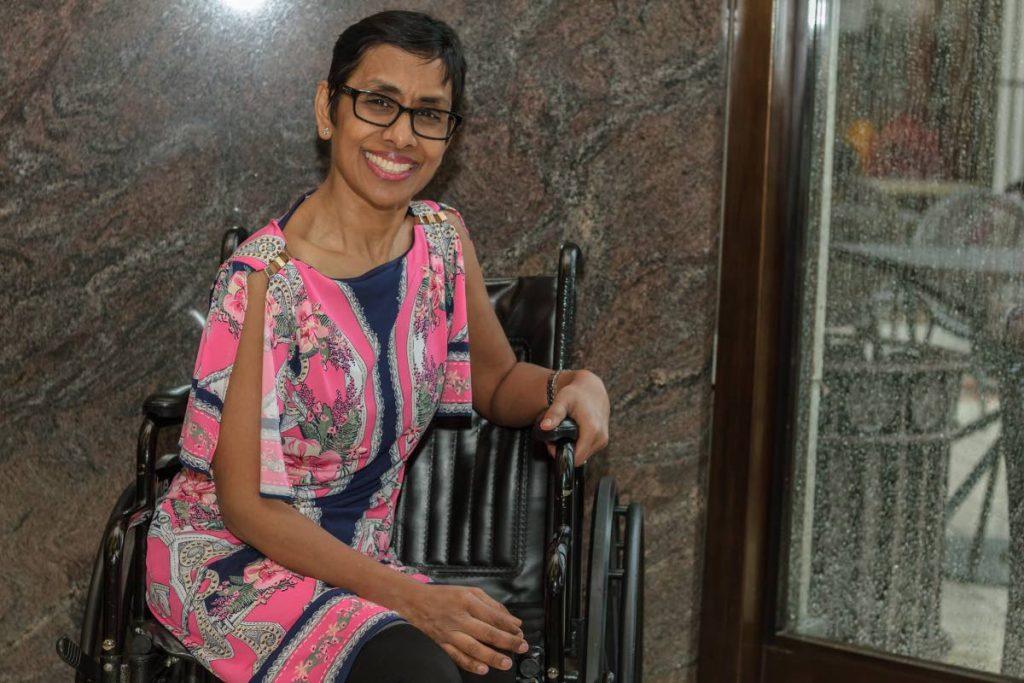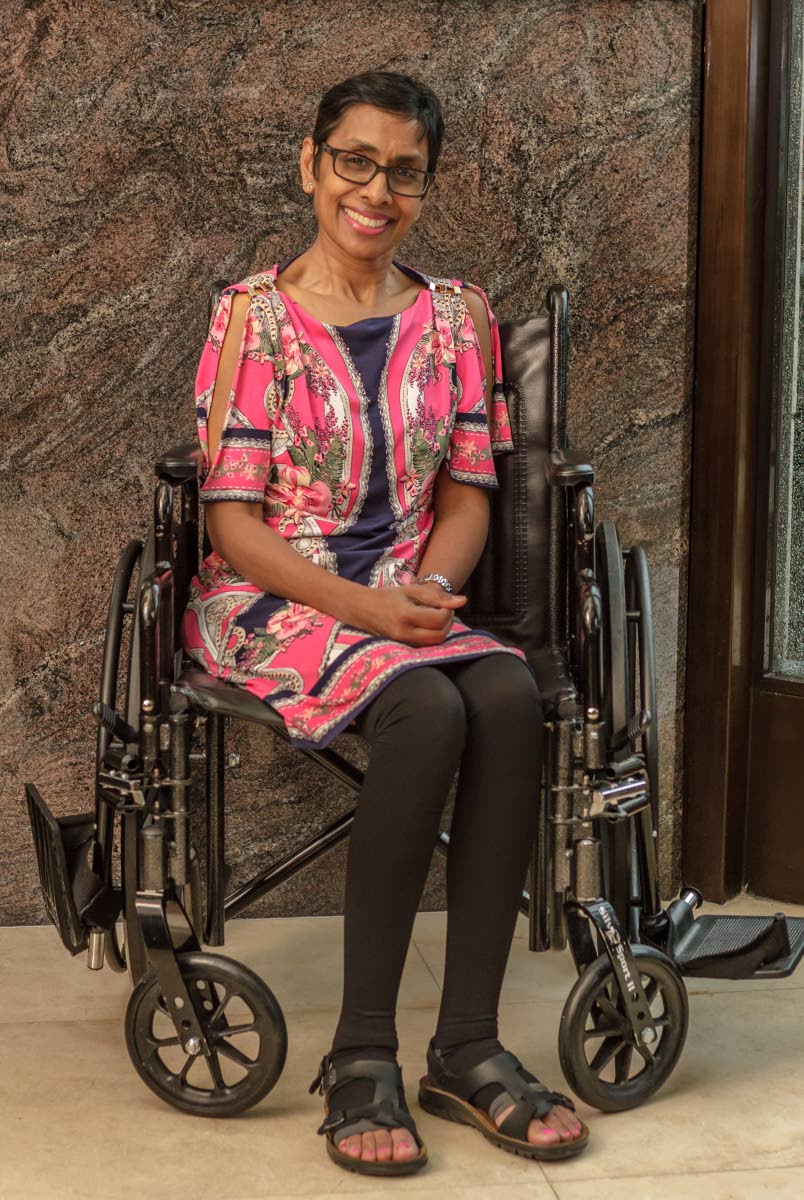Helen Hosein-Mulloon: Life is meant to be lived

How much more can a woman take?
That was the question Helen Hosein-Mulloon, 49, asked herself when she was diagnosed with cancer in 2009.
She asked herself and her husband, Adrian Mulloon, that question many times over the years because, in addition to being a cancer survivor, she has Multiple Sclerosis (MS).
Helen explained that she was diagnosed with MS in 2007 after she fell in her office on Ash Wednesday. Although she had some trouble walking before, she had only recently started using a cane because of muscle deterioration due to MS.
In her case, MS was a blessing and a curse. Because she had MS and was on weekly intramuscular injections, her doctor insisted on a variety of medical tests every six months.
In 2009, on one of the visits, a lump was found on one of her breasts. She was sent to do surgery to have it removed to be tested but the doctor told her not to worry, that it was just fatty tissue.
When she went for her results, because she was not concerned, she took her eight-year-old daughter with her to the doctor. “So I took my daughter, left her playing in the waiting room and the doctor says, ‘You have cancer.’ I almost passed out. My husband was at work offshore, so I told them to call him immediately because he needs to come home. And I did not know what to do.”
Hosein-Mulloon said she was shocked, afraid, and could not believe she had cancer in addition to MS. She said the doctor told her there was no rush for treatment which, at that point, she considered refusing.
She explained that her mother, who was not a smoker, died of lung cancer in 2006 after undergoing herbal therapies rather than chemo and radiation. “She didn’t suffer. My mom died happy. She said she lived, she saw her children grow up, she was sure she wasn’t getting any more grandchildren, she had a husband who adored her, and I wanted to do the same.”
However, he suggested that when her daughter turned 18, they remove her breasts and her womb as a preventative measure against breast and cervical cancer. Bringing her back to reality, she recalled that her eight-year-old was in the next room waiting for her, and she and her 13-year-old son were the reason Hosein-Mulloon decided to undergo chemotherapy.
Therefore, she called her cousin who worked at Johns Hopkins Hospital in Maryland and he demanded she go there to be thoroughly checked over and treated. She did so and in September 2009 she had a second surgery during which they removed more cells and tested her lymph nodes to see if the cancer had spread. It had not.
It was then determined she had Triple-Negative, Stage 2A breast cancer and it was very aggressive.
At once she stopped the injections for MS, because one of the side effects was that they could cause cancer. Since then, her muscle condition has deteriorated to the point where she now must use a wheelchair to get around.
“Believe it or not, after cancer I had three really good years because chemotherapy does the same thing the MS injections do: they suppress the immune system. MS is where the immune system attacks the nervous system so everything was good.”
She wanted to have some good memories with her family. They toured Europe, climbed the Tower of Pisa, and went on a cruise. “When I finished chemo I told my husband, ‘I don’t know how many more great years I’m going to have so we are going to take all the insurance money and go to Europe with the children.’ And we did that.”
She said travelling was always an important part of their lives and she still tries to do so as often as she could. “When you have a challenge it’s to fight it. I knew chemo would kill a lot of things and I refused to let it kill my spirit.”
And it did kill a lot.
Hosein-Mulloon recalled her return to TT and her 20 weeks of chemo. “It was dark. Sometimes I got home at night and I didn’t even want to be there. A lot of it I can’t remember and what I remember I don’t like.”
Since she was well premedicated, she did not get nausea. However, she lost her hair, lost weight, and had a loss of depth perception so she fell a few times. She said she tried to work as much as she could and would only take three days off after a session because she wanted to stay active and keep doing the things she loved.
However, she said she will not do chemotherapy again, now that her children are older, and they do not need her as much as they did back then.
Then she did radiation treatment, which had some complications.
Cancer did not just affect her physically, but her relationships as well. She told WMN when she was first diagnosed, some close family members were there for her all the time while others were not.
She said one particular friend was extremely supportive, looking after her children, visiting often, and carrying her to chemo. Other friends, however, kept her at arm’s length, texting and calling but never visiting.
She was angry at the time because she needed the support of the friends she loved. It took her years to understand that some people simply could not see someone they love suffer, and she eventually forgave them.
In addition, although not going into any details, she said she had a lot of negative reactions to her illnesses from some co-workers and associates. “I think that makes some people angry, that you have a challenge and you overcome it and the little challenges they have, they dig deep and hold on to them.”
Despite her numerous obstacles, Hosein-Mulloon, who is the current president of the MS Society, said she still appreciates the important things in life.
“My life has many good things. I have a husband, who I still adore 20 years later. I have two wonderful children who never did drugs, ran away with anyone, or did anything alarmingly bad. They were normal, typical children who had a higher sense of responsibility because of my illnesses and the things they had to do for me.”
She said having to stay in a wheelchair does not make her unhappy even though she can no longer do some of the things she loves, but having cancer after having MS made her face her mortality, especially after a chemo session. “I did it already with MS, but MS can’t kill you, cancer can.”
She decided she would let everyone know how she feels whenever she feels it. She also refuses to let opportunities pass her by. She said her hope is to leave a legacy with her children -- to know life is meant to be lived, to not take it for granted, to love others, and to leave people remembering them in a positive way.


Comments
"Helen Hosein-Mulloon: Life is meant to be lived"